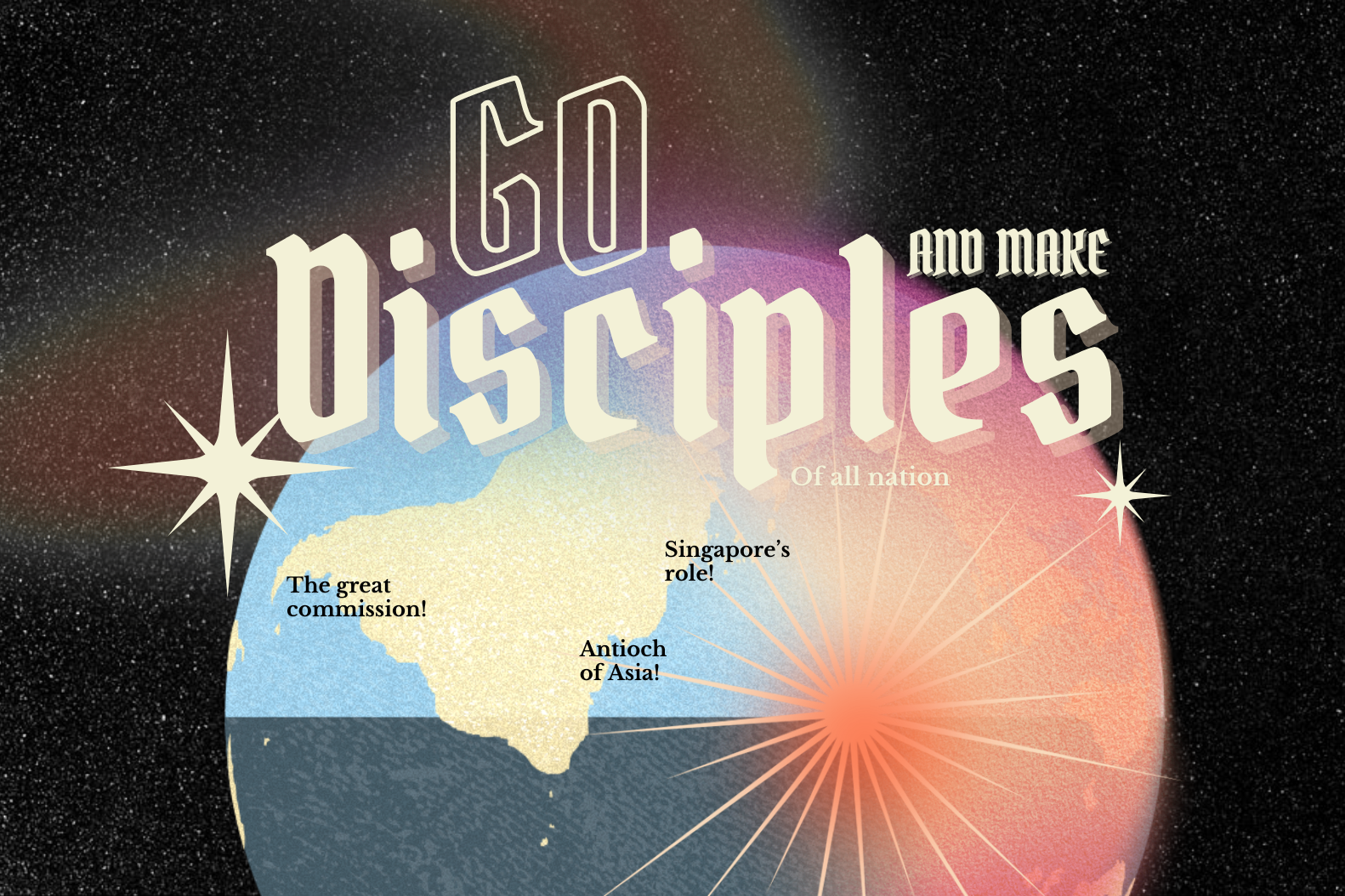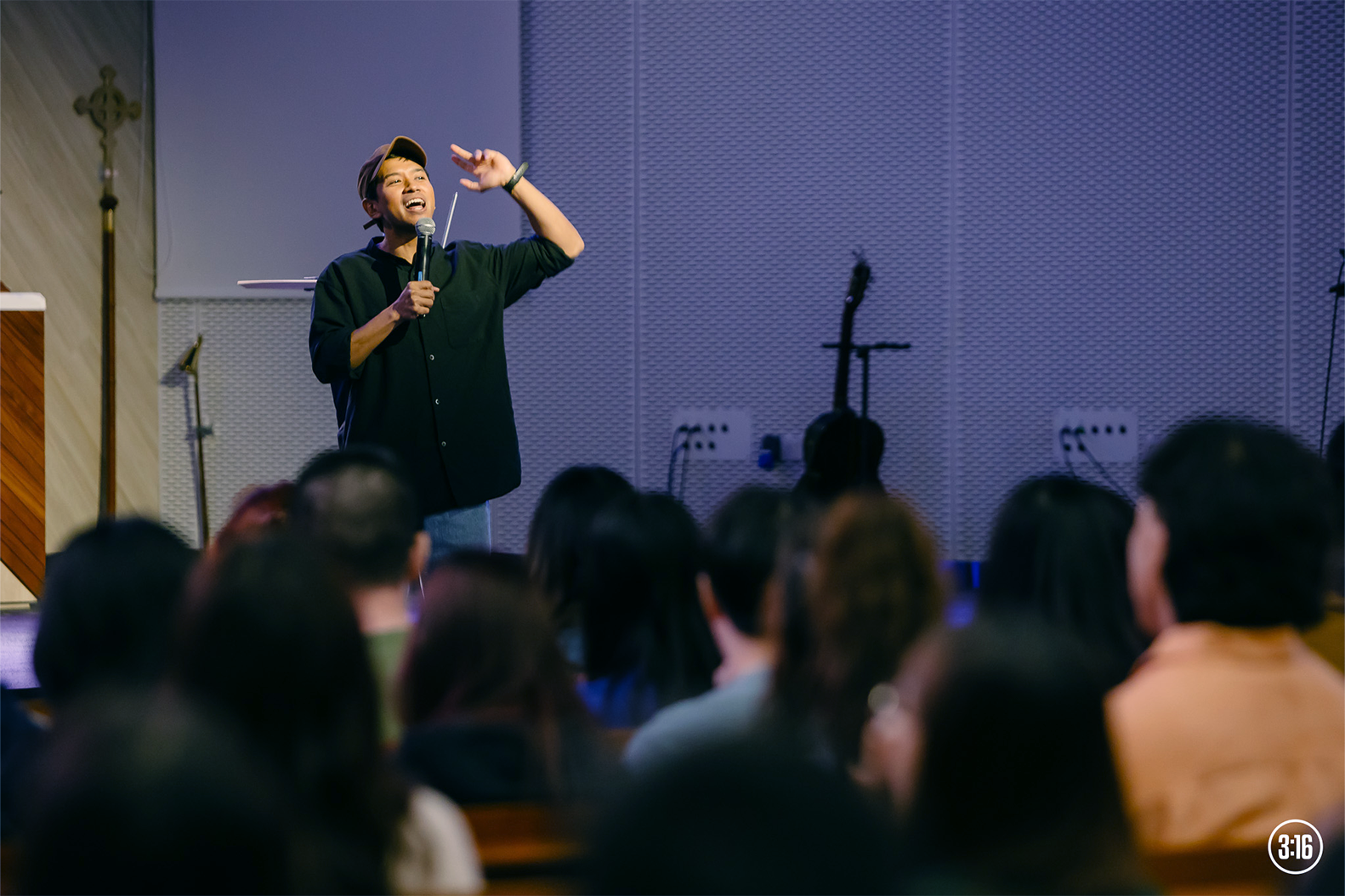Five years ago in 2017, I was sitting at a café by the beach in Timor-Leste. I was on a mission trip and we were given time to reflect with God. The Holy Spirit directed me to a passage I’d always read but never felt moved by.
“As Jesus was walking beside the Sea of Galilee, he saw two brothers, Simon called Peter and his brother Andrew. They were casting a net into the lake, for they were fishermen. “Come, follow me,” Jesus said, “And I will send you out to fish for people.” At once they left their nets and followed him.” (Matthew 4:18-20)
Then I heard it. It was an inaudible, yet clear sensing in my heart: Follow Christ wholeheartedly, at all costs.
Just as these brothers left their lives behind to pursue Christ, the Holy Spirit was calling me to do the same.
With this calling, I returned to Singapore and resumed life.
How God spoke clearly
Meanwhile, in Kona, Hawaii, Jethro Koh (25) was going through his Discipleship Training School (DTS) with Youth With A Mission (YWAM).
There God began sharing His burden for Singapore with Jethro. “It confused me because I never grew up in Singapore,” he recalled.
But having witnessed pockets of revival throughout Europe and America, he began asking God: “How can Singapore catch this wave of revival happening around the world?”

“Together with the questions was my observation of how Singapore is such a blessed nation with finances and discipleship materials at our fingertips,” said Jethro. “But when a nation is blessed with much, much is also expected.
“So, I was also struggling with the question: There are so many churches in Singapore, how can we reach all of them?”
In response, God gave Jethro a vision: A map of Singapore with all the local universities.
And God told him: “Singapore is a small nation and there are five to six physical colleges in Singapore with Christians that go there. If you can light the fire of the Christians that go there, they can go back to their churches and light the fire. From there, the fire will spread beyond the borders.”
With this vision, Jethro came back to Singapore in obedience and faith.
Now a friend of Jethro’s had heard about his vision and thus arranged a meeting for Jethro with Joseph Chean over Facebook messenger. Somehow, however, the meeting fell through.
Nevertheless, Jethro waited expectedly and in God’s timing, He brought together a team. By 2019, Jethro would meet Caleb Goh (23) and Sng Zhong Hao (24) who shared the same heart for God and missions.
And the meeting with Chean that was supposed to happen in 2017? God took care of that too.
In 2020, Jethro and Zhong Hao were attending a Fellowship of Mission Organisation Singapore (FOMOS) meeting when they bumped into Chean.
Before they had even shared what was on their hearts, the Holy Spirit had already prompted Chean that he needed to meet with them. So Chean offered to help them run a pilot missions programme.
Soon, Antioch 21, the missions arm of LoveSingapore also came alongside to support them.
As Jethro, Caleb, and Zhonghao sought the Lord, He sent them their fourth and final team member, Heather Lim (24), in 2021.
Thus, after a season of seeking and waiting on God, Antioch Campus (AC) was born — a missions mobilisation programme aimed to inspire and equip young adults in universities to be missional in thought, word and deed on campus and in life.
Antioch Campus
In time, word was spread and signups were sent out for AC’s first event.
When I registered, I expected the typical church atmosphere I was used to, on-fire but not too on-fire. I also assumed adults would be up in the front leading the programme.
But stepping into the room, the air was different. There was an anticipation and life in these young adults who seemed to be genuinely here for God.
And just like that, conversations were sparking off in the room about God and missions.
Knowing that the older Antioch 21 team championed the next generation by offering their time, resources and experience, God’s love and missional heart were also evident to me in how they transcended generations.
Speaking of generations, I was also surprised to see that it was these four young adults — not very much older than me — who were running the show.
While it was an inspiring sight and motivating to meet brothers and sisters in God’s kingdom rising up to the tasks God has called them to, I personally felt a little… lost.
I felt small and uncertain. What was my assignment, my role, my place in God’s great plan for Singapore?
If God’s plans were a big jigsaw puzzle, and we were each a puzzle piece, I couldn’t yet see where I fit in.
Singapore: Antioch of Asia
But after a season of waiting and seeking, God began opening my eyes through one of AC’s pilot sessions at Zion Bishan Bible-Presbyterian Church, where Chean spoke on cultivating a heart for the least, the last and the lost.
I’ve always hated studying history. But when Chean showed us a video about the history of missions in Singapore, I realised how God’s hand has moved mightily through our nation over the years.
Chronologically, the video recalled how missionaries like Sophia Blackmore and William Oldham came to Singapore and set up mission schools, the campuses of which would became grounds for social transformation and for many students to know Christ.
Having been born as a second-generation Christian in Singapore, I was guilty of taking for granted my spiritual heritage.
Did I even remember that Singapore was once a poor, fishing village?
We were once an unreached people group (UPG) too — people who didn’t have access to the Gospel or who had ever heard about God.
Although we were a small island without any natural resources, God had His eye on us. He sent people to us to preach the Gospel, plant churches and disciple us. We are a nation birthed by missions.
The more I recalled my life experiences, the more it dawned on me that God’s transforming hand has indeed been over Singapore — but what for?

Over the last six months, God has been convicting me that “to whom much is given, much is required”.
God doesn’t exist to meet our needs and wants. As clichéd as it sounds, it’s true: We are blessed by Him to be a blessing to the nations.
Since, as a nation, we are abundantly blessed — much is expected from us.
Here are some ways we are abundantly blessed:
- Quality education: It isn’t just for ourselves to succeed and get good jobs. Our hard skills allow us to go into the nations and support their economies.
- A passport that’s ranked fourth in the world: We have a powerful passport not to go on vacations solely. But God has opened doors for every one of us to travel easily to the nations.
- A multi-racial society: We live and work with fellow Singaporeans of other races. We also have the nations coming into our country for work in both blue and white-collar jobs.
- Bilingualism in Singapore: We’re trained from the get-go to speak our mother tongues. These are languages we can use elsewhere in the world.
When you think about our blessings, you see this is where our Antioch call comes in.
The church in Antioch was a crossroads of the world, a bustling multicultural commercial centre. A missionary-sending church, a city connecting east and west.
Perhaps the only aspect of the Antioch church that Singapore doesn’t yet fully model after is the intentionality in cross-cultural missions. But what if we did?
Serving a missional God is our privilege
For a long time, I had subconsciously boxed God up to exist only in the realm of “church”.
But during one of the sessions in AC’s pilot programme, when we went to Geylang to walk the ground and to pray over the districts, my spiritual eyes were opened.
I saw God’s spirit dwelling in the community as I entered each shophouse.
As I prayed and walked, the Holy Spirit opened my eyes to this truth: God is inviting us to partner with Him.
We shouldn’t be sian to be part of God’s mission. We aren’t doing God a favour — it is our privilege to partner with God.
Our God is a missional one: The Great Commission was not some last-minute afterthought before Christ ascended to heaven.
God’s missional heart isn’t just seen in a couple of verses — it forms the framework of the entire Bible.
Indeed, God’s calling of Abraham in Genesis 12 is just one example of how, through history, He chooses ordinary people to disciple the nations.
Ordinary people like you and me.

But how can we disciple the nations? Well, there are roughly seven spheres of society:
- Family
- Education
- Business
- Science & Technology
- Media & Communications
- Government
- Arts & Entertainment
God isn’t a Sunday God — He is actively involved in every one of these arenas. So, ask which parts of culture reveal God and which parts don’t.
If God’s word is our compass and authority, how can we take God’s truths and God’s heart out into society and restore these spheres of society for Him — in whichever sphere God calls us to?
What can I do?
I came into this pilot programme of Antioch Campus not knowing much. But God brought His people together and poured His own heart into mine. I’ll be sharing some handles that I picked up over the course of six months through sessions and conversations in AC.
1. Live missionally and be part of a missional community
Don’t make missions a once-a-year event, but begin to live missionally. Be strategic about it, have a plan and a process to grow your capacity to do local and cross-cultural missions.
Start by joining or forming teams for ministries to equip and spur others on to step into the missions field.
Join communities that will fan your heart for God and for missions. Being with kindred spirits provides you with connections for support in what God may be calling you to do.
2. Get into prayer
The pandemic may have stopped us from doing short-term missions. But God cannot be hindered.
God convicted me of the power and significance of prayer. When I first complained to God that COVID-19 was hindering us from going beyond our borders, He answered me with this: “If you really cared about the nations, shouldn’t you be praying for them?”
So I began by joining weekly prayer meetings regularly. It started out as taking on God’s challenge, but gradually, God was moulding my heart to become prayerful and to witness firsthand how He moves when we pray.
So start by praying for missionaries, your friends and church partners on the field.

3. Think “long” and “deep”
Prayerfully consider what God may be calling you to. It could be marketplace missions, long-term cross-cultural missions, digital missions or something completely new.
Invest in skills that God is equipping you with, and contribute your business and skills to support missionaries.
Missions isn’t for the elite. Every one of us is commanded to be part of the Great Commission, whether we’re sending out, equipping, supporting or being sent out.
Look into volunteering and serving at a missions agency that can train your skillset.
Make one cross-cultural trip a year, and carry the right attitude when you do: Go and be a learner.
Ask long-term missionaries and find out how you can be effective in cross-cultural missions.
And don’t just go to carry out a programme. Connect with people and learn about their culture and country.
God is raising up warriors in His army to go into the harvest (Ezekiel 37).
Missions isn’t for the “elite”. Every one of us is commanded to be part of the Great Commission, whether we’re sending out, equipping, supporting or being sent out.
But the choice is ours to make. So, let’s say “yes” to wherever, whatever, whoever, whenever and however God calls us.
We can trust that God is good, and already working behind the scenes!
- Read the Great Commission aloud.
- Take a moment to examine your life. Consider your talents, gifts and skillsets.
- Sit before the Lord in prayer. Ask the Lord for practical ways in which you can use these for the Great Commission and begin living missionally.









